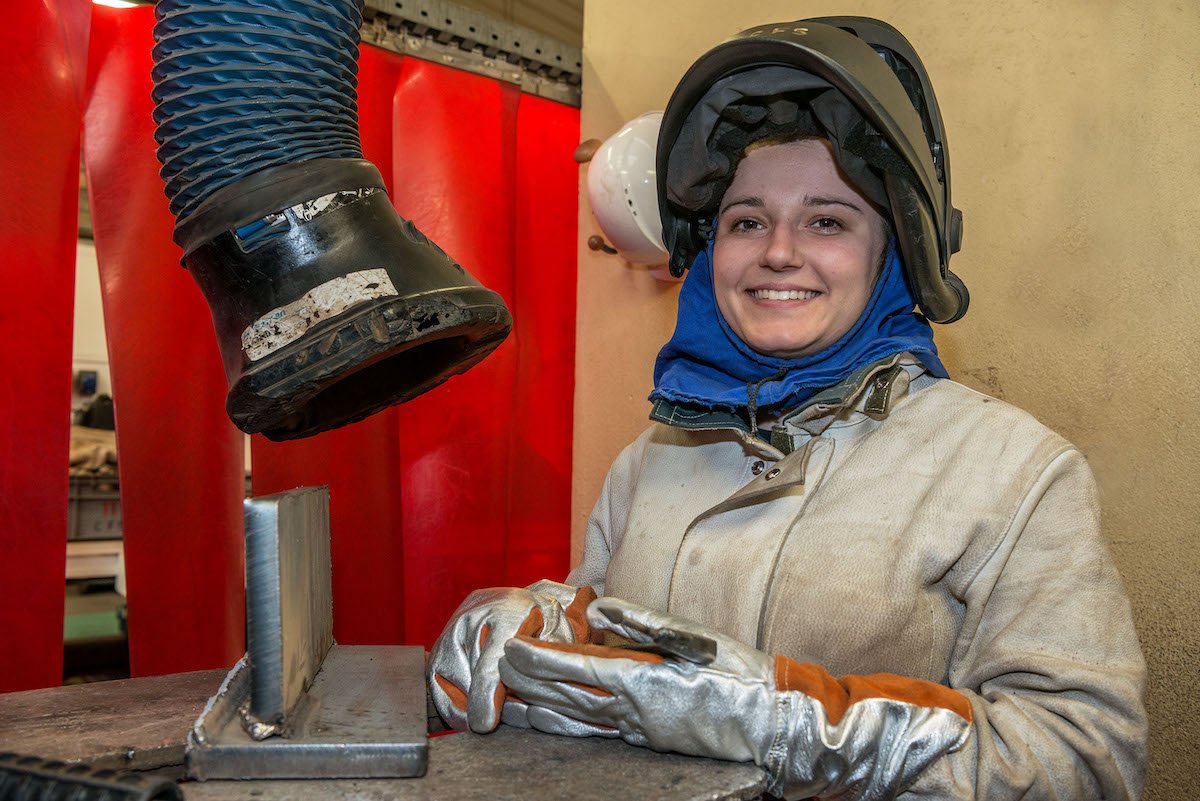Déborah Corrette
Deborah in her work overalls. Photo credit: Naval Group
Déborah is tended to like a top athlete by her employer, Naval Group. Why? Because she's a gold medalist. She didn’t win her medal at the Beijing Winter Olympics earlier this month but rather after three days of competition at Worldskills France in the "welding" category in early January. However, just like the winter sports athletes, she’ll also be going to China to compete in the Worldskills international finals in Shanghai from 12-17 October 2022.
Déborah – who has just turned 23 – has been a welder for four years, working on submarine hulls manufactured by Naval Group in Cherbourg. “I actually wanted to join the Navy but when I explained that I wanted to do welding, the recruiting office sent me to Naval Group because sailors don't do welding themselves. So here I am, happy, because I’m doing a job I love and I’m helping build the boats used by the French Navy!”
She adds that “my taste for manual work comes, I think, from my step-father who did a lot of DIY in our garage. From time to time I’d help him out and I really enjoyed doing that,” she said during our video conversation.
““ I’m doing a job I love and I’m helping build the boats used by the French Navy””
A secondary school student at the Lycée Edmond Doucet in Cherbourg, Déborah had opted to pass a professional baccalaureate in boiler-making, alternating with internships at Naval Group where she’d learn about her future profession from the Group's experienced welders. It was in the lycée that she first heard about Worldskills from some of her contemporaries practising for this competition.
“We were only two girls in my class of 24 but it went pretty well,” she smiles, even though many of her classmates were brought up “in families who worked in that sector,” which was not her case.
To prepare for the 46th Worldskills Competition in Shanghai, where she’ll compete against 40 other youngsters, each having won their own nation’s gold medal in welding, she trains two weeks a month. “I base my training on the questions that have come up in the past for the four modules of the competition,” she explains.
For the first module she’ll have to weld parts together; her work will be X-rayed by the examiners. The second module is “the one that can earn me the most points. In 10 hours we have to construct a steel box using welding techniques imposed by the jury. The latter checks the quality of our work by pouring water into the box to check that none leaks out.” For the other two modules, she’ll have to make one object in aluminium and another in stainless steel. The competition takes place in one go, there are no qualifying rounds.
For her trip to China Déborah will be accompanied by at least two professionals and 40 kg of equipment because “everything will be duplicated: my protective equipment as well as my toolbox.”
During her two week training period, Déborah spends one week at the Naval Group Internal Training Centre and another at the Lycée Doucet. The remaining days of the month “I do my normal job,” she explains.
This “normal job” is to work in one of six welding teams, each consisting of 15 welders. “I either work mornings from 5:30 a.m. to 1 p.m. or afternoons from 1 p.m. to 8 p.m. but I don't work at night at the moment even though others do.”
Deborah in her protective welding gear. Photo credit: Naval Group
At weekends she devotes herself to physical and psychological preparation. “I swim and walk and I also meditate and practice yoga and visualisation,” just like a top athlete. But she’s also careful to put time aside just for herself at the weekends. “It's important to have a personal life as well,” she stresses.
For the French competition, Déborah was competing against 11 other welders, including a girl. By the way the other young woman – who works at Alstom - won the bronze medal! “There were a lot of tears of joy at the medal ceremony, especially amongst my family,” she smiles.
Obviously it's not just the welders at these Worldskills. “I found it fascinating to see close up the work done by the bakers, chocolate makers, and all the others, but the ones that surprised me the most were the stonecutters!”
Looking 10 years ahead, Déborah sees herself as an instructor. “I’d like to pass on everything that I’ve been taught. In this profession there’s a lot of training. We never work alone, always as a team. You have to be thorough and know how to adapt and have a real passion for the job,” she remarks. She adds that it’s not the physical stress: the heat and wearing heavy protective clothing "because you get used to that quickly and then you forget about it” that is the most difficult in her job, but rather the mental pressure "because we must work as minutely as possible and make no mistakes. The lives of our sailors depend on it.”





